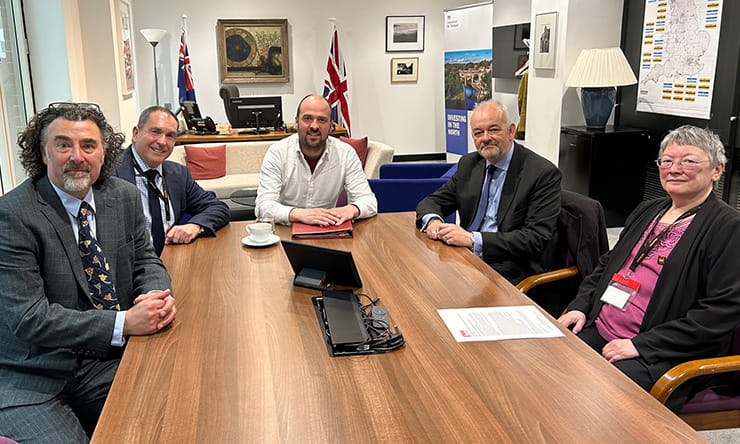UK Transport Minister ‘acknowledges much to learn about motorcycling’
By John Milbank
Consumer Editor of Bennetts BikeSocial
24.05.2023
From left to right: Graeme Collins (CEO TRF), Antony Kildare (CEO IAM Roadsmart), Richard Holden MP, Craig Carey-Clinch (NMC), Anna Zee (Director BMF).
This image courtesy of NMC. Social media thumbnail image credit: Roger Harris
The Transport Minister, Richard Holden MP, is reported to have said in a meeting with the National Motorcyclists Council (NMC) that he is ‘open to developing better policies for motorcycling as part of the Department for Transport’s approach to overall transport matters and the future of transport.”
Mr Holden, who was appointed Parliamentary Under Secretary of State at the Department for Transport on 28 October 2022, is said to have acknowledged that ‘there was much he needed to learn about motorcycling’ and ‘agreed that further work on rider licensing, safety and various areas of regulation is needed.’
The contribution motorcycling brings to transport and society was discussed in the meeting, which included senior executives from the British Motorcyclists Federation (BMF), IAM Roadsmart and the Trail Riders Fellowship (TRF).
Besides the substantial leisure and organised sports contribution that motorcycling brings to the UK, the delegation outlined the importance of powered two wheelers in commuting and practical purposes, also highlighting the £7billion it delivers to the economy. The motorcycle sports sector is worth a further £1billion.
The benefits of motorcycles as a key step towards decarbonisation were discussed, along with the need to avoid applying a ‘one size fits all’ approach to different road users in the phasing out of fossil fuelled vehicles and instead to adopt a multi-technological approach.
NMC Executive Director Craig Carey-Clinch said: “This was a very positive ministerial meeting and Mr Holden was clear about what he does and doesn’t know about motorcycling, and was keen to know more. His strong support for motorcycles in bus lanes was very welcome, as was his open mind about many of the issues that the NMC raised. NMC members were able to raise individual issues and received a positive reception to these.”
Mr Holden was asked in the meeting to provide DfT officials with the tools and the mandate needed to develop the work of the recently formed government Motorcycle Strategy Group, so that it can move towards creating strategic policies for motorcycling in transport policy overall.
But although Mr Holden is reported to have seemed open to developing motorcycling as a transport option, it’s said that ‘it was very clear that the long-standing view that motorcycling is a safety problem to be solved and not a transport opportunity to be supported is still firmly embedded in some parts of the DfT’.
NMC members argue that this viewpoint continues to act against motorcycle safety, though on a more positive note, the Council is now engaged in a series of policy processes with the DfT additional to safety, and the Council is gradually working towards creating a much better government policy environment. Key to this will be the development of a new motorcycling strategy and the NMC says it ‘welcomes the Minister’s support for the work of the Motorcycle Strategy Group’ and ‘looks forward to working with officials on a range of matters relating to this’.
The BMF’s presentation to the government
The BMF focussed on the lack of motorcycling in wider transport policies, the need for emerging ‘smart’ roads and vehicle technologies, plus automated systems, and how important it is to take motorcycles into account in both R&D and in practice.
The BMF also raised the issue of motorcycle taxation.
IAM Roadsmart’s presentation to the government
IAM RoadSmart raised research and advancements in PPE, making safer equipment more accessible though removing VAT, plus offering grants for certain items.
The need for improved riding skills, particularly in the gig economy was discussed, plus support for post-test training.
The issue of potholes was also raised by IAM Roadsmart and the need for a long-term funding strategy to eliminate the backlog of roads repairs.
The need to allow motorcycles into bus lanes in all locations was also raised – something that Mr Holden strongly agreed with. How that can be achieved, particularly by local authorities will be explored further.
The IAM also outlined its forthcoming initiatives and Mr Holden agreed to support these.
The TRF’s presentation to the government
The TRF focused on green roads matters, illustrating how riding unsealed highways is not just a leisure pursuit, but also a key part of what can be described as ‘more active travel’ due to the health and mental wellbeing benefits that comes from riding green roads and green lanes.
The TRF raised the issue of the confusing patchwork of regulation and how a more common-sense approach to Traffic Regulation Orders (TRO) needs to be established, so avoiding the need for legal cases to resolve problems.
Noting that last year’s DFT consultation on Traffic Regulation Orders has yet to result in announcements, the TRF requested that further dialogue takes place with the DfT on TROs before further decisions are made.
The NMC’s presentation to the government
The NMC raised the issue of licensing reform – the need for positive changes to Compulsory Basic Training that were announced by the Government in 2018, but never implemented – plus the need to consider wider licensing policy. This was taken on board, and there was consensus in the meeting about the need to take positive steps on CBT regulation.
Share on social media:
